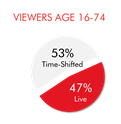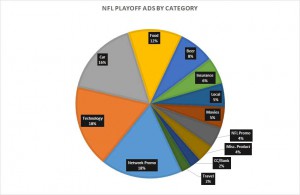We’ve all seen the advertisements for beer, lawnmowers and men’s razors while watching a sporting event. They’re in commercials, on posters around the arenas and fields, and on the athletes’ clothes. But what we might not notice is that most of the products marketed during games have one thing in common: they are mostly geared towards the assumed male audience.
It is generally presumed that sports fans are men, but more women are in to sports than you would think. According to a Gallup poll, 51% of women in the U.S. are sports fans, making up a total of 40% of the sports fan base. Across the board, from NHL to Nascar, 35-45 percent of sports fans are women; that’s more than a third of the audience watching hours of advertisements that, for the most part, isn’t relevant to them.
Take a look at the chart below. It shows the breakdown of commercials aired during the 2016 NFL playoffs. The promotions are either geared towards men or they aren’t gender specific. None of the broadcasted products are geared specifically towards women, yet according to this article 40% of NFL fans are women.
Although football ads aren’t directed towards women, the NFL itself has started recognizing its female fan base and includes them in their clothing advertisements like the one below. They are even sponsored by CoverGirl, a beauty product company, but they are one of the only leagues that are so inclusive of their female fans.
https://www.youtube.com/watch?v=zUhjBiyfh24
If there are so many women watching sports, why aren’t female brands using this opportunity to market their products? Perhaps they think that advertising during sporting events is too expensive or that they can get a better return on investment with shows that have stronger female viewership like The Bachelor and The Voice.
To address the first point, yes, buying airtime during sports event with high viewership can be expensive, but a sponsorship is a whole other story. A team or player can only be sponsored by only one of everything—one beer company, one clothing company, etc. However, when it comes to women’s products, there is little to no competition. A women’s product could have that one sponsorship spot for a low price, much lower than what the big beer and clothing company are paying.
Regarding the second point, there are numerous shows with more female viewership than sporting events, but more and more people aren’t watching live TV. According to a study done by Hub Entertainment Research, the average viewer watches only 47% of their TV shows live. Additionally, when viewers are watching TV from a DVR, 56% of them skip every commercial. As a result, advertisements get lost and suddenly you aren’t reaching as many people as you thought you were.
![]()

Sporting events, on the other hand, need to be watched live. Viewers are completely engaged with the game in the moment. There is no commercial skipping. Sporting events are also more frequent than TV shows. A single MLB team plays an average of 6 games a week, an NHL and an NBA team an average of 3 games a week, in addition to games played by the 29 other teams in those leagues.
There’s more than one way to advertise to female sports fans, and you don’t have to shell out loads of money to do it. The potential audience, the number of women you could reach with a single ad or sponsorship during a football game, a soccer game, or any sporting event is huge. It’s too big of an opportunity for women’s brands to continue to miss out on.
